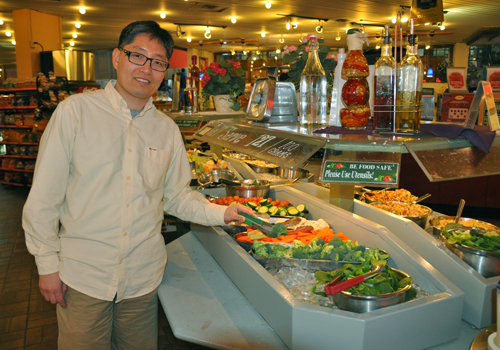
An app a day keeps the doctor away. That’s the goal of a new app that will send easy-to-prepare vegetable recipes to smartphone users in the hope that these delicious dishes will get them to eat more greens. Canada’s Food Guide recommends that adults eat seven to 10 servings of fruits and vegetables daily.
According to interviews conducted by a research team led by Prof. Sunghwan Yi, Marketing and Consumer Studies, participants said they would like to incorporate more vegetables into their diet, and they were aware of the health benefits of doing so, but they didn’t practice what they preached.
“I think the most important thing is taste,” says Yi, explaining why some people don’t eat as many vegetables as they should. “People naturally prefer sweet and salty foods, and a vegetable does not exactly fit in that category.”
Vegetables also aren’t as convenient to prepare as other foods. Unlike fruits, which can be washed, peeled and eaten raw, most vegetables need to be cooked before they can be eaten. “It takes time and effort to prepare vegetables,” says Yi. “You don’t necessarily want to eat garden salad every day.”
The app would send a recipe in the late afternoon, beeping subscribers before they head home from work. That way, they would have the recipe at their fingertips when they pick up groceries on their way home. Plus, it’s easier than lugging around a cookbook at the grocery store.
“At the time you need this information, you must have it in your hand,” says Yi. “That can easily be done with the smartphone app because we carry our smartphones all the time. This instant accessibility is what separates my idea from other ideas.”
Yi’s research has received funding from the Ontario Ministry of Agriculture, Food and Rural Affairs. The app is currently in the development stage, and he is looking for an industry partner, either a grocery store chain or a vegetable growers association.
“Food retailers could use this app to better communicate with their customers,” he says. “If a store receives a big shipment of a certain vegetable that they can only store for a week’s time, they have to sell it rather quickly.” The app would serve as an electronic flyer, allowing stores to instantly notify customers of sales rather than waiting for the weekly paper flyer.
“We have a deal going on, and you can make these kinds of dishes based on these vegetables,” says Yi, giving an example of how stores could use the app to sell more vegetables. The app could also be used to promote locally-grown produce.
The recipes would be tailored to the recipient’s preferences. For example, if you purchase eggplant on a regular basis, you would receive recipes that include this vegetable. The app would also remember your favourite recipes and recommend other vegetable dishes you might like.
Not knowing how to prepare vegetables is another reason why people avoid buying them. Yi says people of all ages lack cooking skills because they didn’t learn them at home or in school. “It is possible to prepare enjoyable vegetable dishes, but you need to learn how to do so,” he adds. “The challenge is that learning to cook is not one of the prized skills in our society anymore.”
Time is another factor. “Many parents who work full-time often have less than 30 minutes to prepare something for dinner,” says Yi. It’s easier for them to order takeout or microwave a frozen dinner.
He encourages consumers to experiment with new recipes, ingredients and preparation methods.
“The only way to enjoy vegetables is to prepare tasty meals, and I believe that the vegetable recipe app will really help people prepare tasty meals with vegetables.”